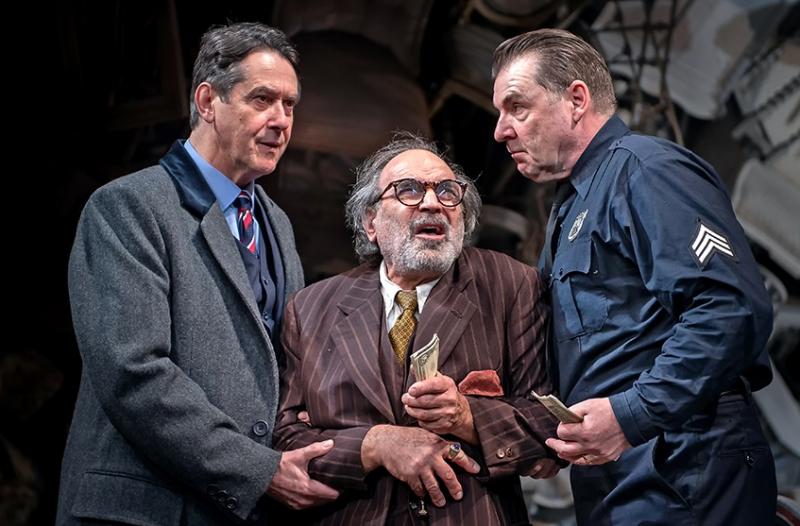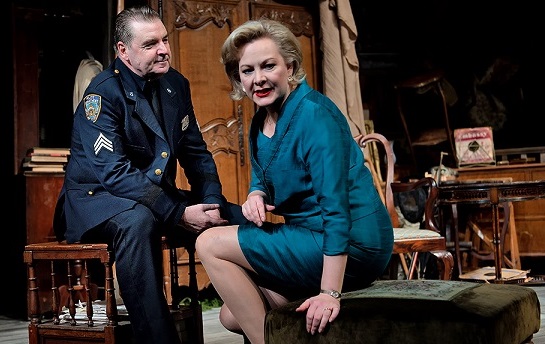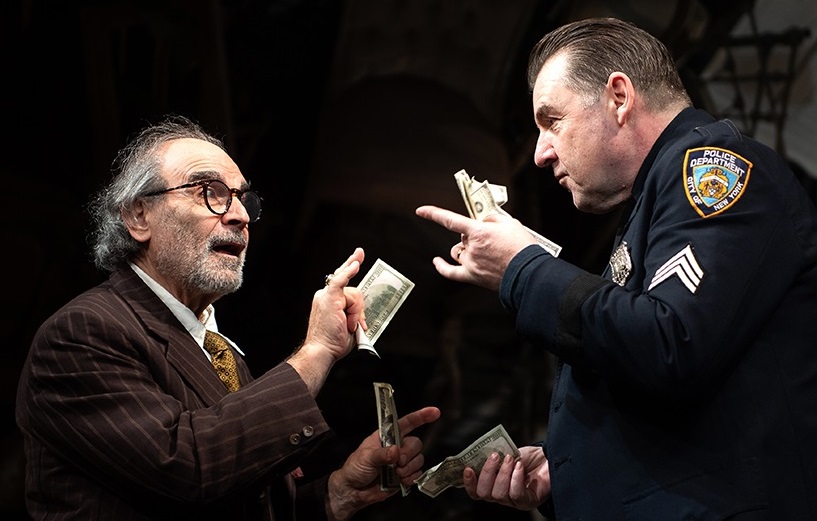The Price, Wyndham's Theatre review - David Suchet stands supreme | reviews, news & interviews
The Price, Wyndham's Theatre review - David Suchet stands supreme
The Price, Wyndham's Theatre review - David Suchet stands supreme
Powerful production of Arthur Miller's play of fraternal discord, past pain

There’s a rather sublime equilibrium to Arthur Miller’s 1968 play between the overwhelmingly heavy weight of history and a sheer life force that somehow functions, against all odds, as its counterbalance.
Jonathan Church’s production, first seen at Theatre Royal Bath last summer, plays at the beginning with an intentional languor, as Victor (Brendan Coyle) slowly, silently explores the place that had defined his early years, the old Manhattan brownstone where he once lived with his father. Designer Simon Higlett’s masterful set, dominated on one side by an elaborate high waterfall of furniture, catches the overcrowded accumulation of a lifetime of which Vic is now determined to rid himself through a quick, job-lot sale to his expected purchaser. As he’s joined by his wife Esther (Sara Stewart, pictured above, with Brendan Coyle), their present – his police career, with its possibilities of early retirement, her discontent, defined around money and assuaged, we increasingly suspect, with drink – is gradually sketched in. But in this environment, it’s clear principally that the present has never really escaped the shadow of its past, in particular Vic’s unresolved relationship with the brother, Walter (Adrian Lukis), that he hasn’t seen in years, and whom he little expects to be seeing now.
As he’s joined by his wife Esther (Sara Stewart, pictured above, with Brendan Coyle), their present – his police career, with its possibilities of early retirement, her discontent, defined around money and assuaged, we increasingly suspect, with drink – is gradually sketched in. But in this environment, it’s clear principally that the present has never really escaped the shadow of its past, in particular Vic’s unresolved relationship with the brother, Walter (Adrian Lukis), that he hasn’t seen in years, and whom he little expects to be seeing now.
But once Suchet’s Solomon arrives, there’s no interfering with his way of doing things. He exists in his own timescale, one which takes into account the decades that extend behind him, and purchase is somehow secondary to procedure here, a whole rigmarole that involves getting-to-know and then some, repetitions and reassessments so elaborate that price may not even be the final factor. His tactics are the antithesis of Vic’s increasingly exasperated requests for a clear price, the “factual” demands of the younger man’s reality set against the old man’s insistent assertions of the value of “viewpoint” (value and price are recurring themes here in every sense).
Miller remorselessly ramps up his re-examination of past choices and motivations
Suchet achieves something that could practically be called “stage capture”, even as dramatic development somewhat stalls, before a second half that introduces, not a moment too soon, the meat of Miller’s drama. Fraternal reunion here is a short fuse that reignites the tensions of four decades earlier, when the Great Depression decimated the circumstances of the brothers’ young lives (it impacted on Miller’s own teenage years every bit as acutely, making this a deeply felt drama). It wasn’t just the abrupt transition from gloried prosperity to almost abject poverty that damaged, but also the psychological sense of their father’s fall being one from which there could be no rebound; the agonised verdict articulated here, that “men don’t bounce”, rings every bit as true for those who did manage to live through it as those who threw themselves out of windows.
These past circumstances have proved fertile ground for festering recriminations. The two brothers had been equally talented as students, but where Walter was able to continue education and eventually became a successful (and rich) surgeon, Vic stayed behind to look after his downcast dad, sacrificing whatever opportunities he might have had for the deadbeat stability of a police career. But even that is only half of a convoluted story that also sets success against the conviction of having done the right thing, as Miller remorselessly ramps up his re-examination of past choices and motivations. (Pictured below, David Suchet, Brendan Coyle) It makes for a rapid-fire denouement, as if after the narrative longeur of its first half The Price is determined to catch up, to conduct as full as possible a psychological inquest in the shortest possible time frame, the periodic reappearances of Solomon serving as tension-breakers in the condensed action. But any such structural shortcomings notwithstanding, Miller gives his characters an encompassing breadth that keeps them both anchored in achingly real circumstances while also embodying something that goes beyond them, a moral reckoning with life, if you like. The Price’s casualties are such that no-one will ever emerge a winner, but we surely feel most strongly for Victor and the endurance with which he has negotiated life’s hardships: Coyle’s performance, perfectly capturing the sheer ungainliness of this unlikely hero, goes the extra mile to bring that home. But if endurance is the decisive factor, it’s Solomon who stands supreme here. Suchet gives a stellar performance, illuminating an already distnguished dramatic firmament.
It makes for a rapid-fire denouement, as if after the narrative longeur of its first half The Price is determined to catch up, to conduct as full as possible a psychological inquest in the shortest possible time frame, the periodic reappearances of Solomon serving as tension-breakers in the condensed action. But any such structural shortcomings notwithstanding, Miller gives his characters an encompassing breadth that keeps them both anchored in achingly real circumstances while also embodying something that goes beyond them, a moral reckoning with life, if you like. The Price’s casualties are such that no-one will ever emerge a winner, but we surely feel most strongly for Victor and the endurance with which he has negotiated life’s hardships: Coyle’s performance, perfectly capturing the sheer ungainliness of this unlikely hero, goes the extra mile to bring that home. But if endurance is the decisive factor, it’s Solomon who stands supreme here. Suchet gives a stellar performance, illuminating an already distnguished dramatic firmament.
rating
Share this article
The future of Arts Journalism
You can stop theartsdesk.com closing!
We urgently need financing to survive. Our fundraising drive has thus far raised £49,000 but we need to reach £100,000 or we will be forced to close. Please contribute here: https://gofund.me/c3f6033d
And if you can forward this information to anyone who might assist, we’d be grateful.

Subscribe to theartsdesk.com
Thank you for continuing to read our work on theartsdesk.com. For unlimited access to every article in its entirety, including our archive of more than 15,000 pieces, we're asking for £5 per month or £40 per year. We feel it's a very good deal, and hope you do too.
To take a subscription now simply click here.
And if you're looking for that extra gift for a friend or family member, why not treat them to a theartsdesk.com gift subscription?
more Theatre
 The Producers, Garrick Theatre review - Ve haf vays of making you laugh
You probably know what's coming, but it's such great fun!
The Producers, Garrick Theatre review - Ve haf vays of making you laugh
You probably know what's coming, but it's such great fun!
 Not Your Superwoman, Bush Theatre review - powerful tribute to the plight and perseverance of Black women
Golda Rosheuvel and Letitia Wright excel in a super new play
Not Your Superwoman, Bush Theatre review - powerful tribute to the plight and perseverance of Black women
Golda Rosheuvel and Letitia Wright excel in a super new play
 Cow | Deer, Royal Court review - paradox-rich account of non-human life
Experimental work about nature led by Katie Mitchell is both extraordinary and banal
Cow | Deer, Royal Court review - paradox-rich account of non-human life
Experimental work about nature led by Katie Mitchell is both extraordinary and banal
 Deaf Republic, Royal Court review - beautiful images, shame about the words
Staging of Ukrainian-American Ilya Kaminsky’s anti-war poems is too meta-theatrical
Deaf Republic, Royal Court review - beautiful images, shame about the words
Staging of Ukrainian-American Ilya Kaminsky’s anti-war poems is too meta-theatrical
 Laura Benanti: Nobody Cares, Underbelly Boulevard Soho review - Tony winner makes charming, cheeky London debut
Broadway's acclaimed Cinderella, Louise, and Amalia reaches Soho for a welcome one-night stand
Laura Benanti: Nobody Cares, Underbelly Boulevard Soho review - Tony winner makes charming, cheeky London debut
Broadway's acclaimed Cinderella, Louise, and Amalia reaches Soho for a welcome one-night stand
 The Pitchfork Disney, King's Head Theatre review - blazing with dark energy
Thrilling revival of Philip Ridley’s cult classic confirms its legendary status
The Pitchfork Disney, King's Head Theatre review - blazing with dark energy
Thrilling revival of Philip Ridley’s cult classic confirms its legendary status
 Born with Teeth, Wyndham's Theatre review - electric sparring match between Shakespeare and Marlowe
Rival Elizabethan playwrights in an up-to-the-minute encounter
Born with Teeth, Wyndham's Theatre review - electric sparring match between Shakespeare and Marlowe
Rival Elizabethan playwrights in an up-to-the-minute encounter
 Interview, Riverside Studios review - old media vs new in sparky scrap between generations
Robert Sean Leonard and Paten Hughes make worthy sparring partners
Interview, Riverside Studios review - old media vs new in sparky scrap between generations
Robert Sean Leonard and Paten Hughes make worthy sparring partners
 Fat Ham, RSC, Stratford review - it's Hamlet Jim, but not as we know it
An entertaining, positive and contemporary blast!
Fat Ham, RSC, Stratford review - it's Hamlet Jim, but not as we know it
An entertaining, positive and contemporary blast!
 Juniper Blood, Donmar Warehouse review - where ideas and ideals rule the roost
Mike Bartlett’s new state-of-the-agricultural-nation play is beautifully performed
Juniper Blood, Donmar Warehouse review - where ideas and ideals rule the roost
Mike Bartlett’s new state-of-the-agricultural-nation play is beautifully performed
 The Gathered Leaves, Park Theatre review - dated script lifted by nuanced characterisation
The actors skilfully evoke the claustrophobia of family members trying to fake togetherness
The Gathered Leaves, Park Theatre review - dated script lifted by nuanced characterisation
The actors skilfully evoke the claustrophobia of family members trying to fake togetherness
 As You Like It: A Radical Retelling, Edinburgh International Festival 2025 review - breathtakingly audacious, deeply shocking
A cunning ruse leaves audiences facing their own privilege and complicity in Cliff Cardinal's bold theatrical creation
As You Like It: A Radical Retelling, Edinburgh International Festival 2025 review - breathtakingly audacious, deeply shocking
A cunning ruse leaves audiences facing their own privilege and complicity in Cliff Cardinal's bold theatrical creation

Add comment